A business that installs Starlink satellite dishes for customers in northern Ontario says it’s been getting more calls from customers with Xplore (formerly known as Xplorenet).
“They’ve been calling, reaching out to me and just telling me, ‘Hey Nick, I’m being cut off,’” said Nick Lavoie, the owner of Northern Internet Solutions.
Some customers with Xplore’s satellite internet service received an email that said they would lose their internet service by late November or early December, depending on their location.
Xplore confirmed in an email with CBC News that one of its partners is ending its satellite service, “which means that a small portion of our satellite customers will no longer have access to this service.”
The company did not elaborate on how many people are impacted by the cancelled service.
It did say it’s “working diligently” to transition those customers to the Xplore’s other services, such as fixed wireless and fibre internet when possible.
 Some rural internet providers like Xplore offer fixed wireless service as an option, where a tower is used to wirelessly connect customers to high-speed internet. (Rob Kruk/CBC)
Some rural internet providers like Xplore offer fixed wireless service as an option, where a tower is used to wirelessly connect customers to high-speed internet. (Rob Kruk/CBC)
Xplore added that it’s investing $1.6 billion over the next few years in network upgrades to service Canadians in rural and remote areas.
Cathy Prentice lives in the rural Worthington area of Greater Sudbury, and received an email that said after years with the company, she would lose her Xplore satellite internet service in December.
“It worked pretty well. People complained about it, but I never did. I never had a problem,” she said.
Prentice said Xplore doesn’t offer other services at her address, but in recent years, both Rogers and Starlink added options in her part of northern Ontario.
She called Lavoie and he installed her new Starlink satellite dish.
“It’s fine. I find it’s a little bit more expensive than Xplorenet,” she said of her new internet service.
Rural internet gap
Susan Church, executive director of the North Bay-based Blue Sky Economic Growth Corporation, said Xplore’s service cancellation highlights the ongoing gap in high-speed internet access for northern and rural communities.
While more than 90 per cent of Canadian households are connected to high-speed internet with download speeds of 50 megabits per second or more, Church said the numbers are much lower in northern Ontario.
According to Blue Sky, 75 per cent of households in northern Ontario reach that threshold and the number drops to 56 per cent if the region’s five largest cities aren’t counted.
But Church said those numbers don’t include the Starlink satellite internet service, since Blue Sky has no way of tracking its numbers.
The federal government has set a goal for all Canadian households to have high-speed internet access by 2030. The provincial government has set a timeline to meet that same goal by the end of 2025.
In 2021, both levels of government announced a $1.2-billion Canada–Ontario broadband partnership to help meet those timelines.
Last week, the Canadian company Telesat announced it purchased a plot of land in the northern Ontario city of Timmins that will serve as a landing station to service its own low Earth orbit satellite network.
The company plans to launch its Telesat Lightspeed service in the coming years.
Church said smaller internet service providers are leading the charge to connect rural Canadians, since the business case isn’t often strong enough for bigger companies to invest in those areas.

